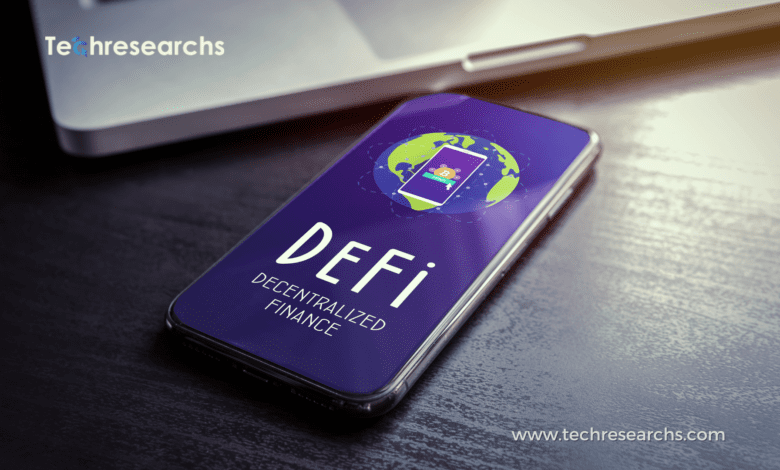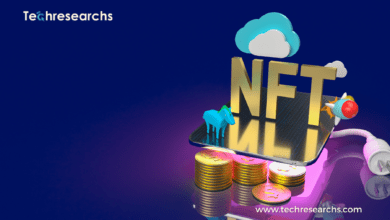How Decentralized Finance (DeFi) is Revolutionizing the Industry


Decentralized finance (DeFi) is a rapidly growing trend in the financial world that aims to create more secure and accessible financial systems through the use of blockchain technology.
Decentralized Finance (DeFi) enables financial transactions and operations to be conducted without intermediaries, reducing costs and increasing transparency and security.
In this article, we will explore the basics of Decentralized Finance (DeFi), the role of decentralized blockchain in DeFi, and the potential benefits and risks associated with this new form of finance.
What is DeFi?
DeFi is a new form of finance that uses decentralized blockchain technology to create secure and transparent financial systems. The main goal of Decentralized Finance (DeFi) is to create a financial system that is open, accessible, and operates without intermediaries. In DeFi, users can participate in financial transactions and operations, such as lending and borrowing, without relying on traditional financial institutions.
How Does Decentralized Blockchain Play a Role in DeFi?
Decentralized blockchain is the backbone of DeFi. This technology enables secure and transparent financial transactions and operations to be conducted without intermediaries.
In a DeFi system, users can interact directly with one another, without the need for a central authority to oversee the transactions.
This eliminates the need for intermediaries, such as banks or financial institutions, reducing costs and increasing transparency.
Decentralized blockchain also enables DeFi to operate in a trustless environment.
Trust is a critical factor in financial transactions and operations, and decentralized blockchain ensures that users can trust each other without the need for a central authority to mediate transactions.
This is because decentralized blockchain uses cryptographic algorithms to secure transactions and operations, reducing the risk of fraud and providing greater transparency.
Benefits of Decentralized Finance (DeFi)
Accessibility:
Decentralized Finance (DeFi) provides a more accessible financial system, enabling people to participate in financial transactions and operations regardless of their location or financial status. This is because DeFi operates on a decentralized blockchain, which eliminates the need for intermediaries and reduces the barriers to entry for users.
Lower costs:
By eliminating intermediaries, Decentralized Finance (DeFi) reduces the cost of financial transactions and operations, making it more affordable for users. This is because traditional financial institutions typically charge fees for their services, which are eliminated in DeFi.
Transparency:
Decentralized blockchain provides greater transparency in financial transactions and operations, as all transactions are recorded on a public ledger. This provides users with greater visibility into the financial system and reduces the risk of fraud.
Security:
Decentralized blockchain provides a more secure financial system, as transactions and operations are secured through cryptographic algorithms. This reduces the risk of fraud and increases the security of financial transactions and operations.
Risks of Decentralized Finance (DeFi)
Lack of regulation: DeFi operates outside of traditional financial institutions, and as a result, it operates in an unregulated environment. This means that there is a risk of fraud and mismanagement, as there are no regulatory bodies to oversee the DeFi system.
Volatility:
DeFi operates in a highly volatile market, with prices for Decentralized Finance (DeFi) assets and tokens fluctuating rapidly. This volatility can result in significant losses for investors and can also lead to instability in the DeFi system.
Technical complexity:
DeFi can be technically complex, and users may need to have a high level of technical knowledge to participate in financial transactions and operations. This can limit the accessibility of DeFi for some users.
Risk of hacking:
Decentralized blockchain is vulnerable to hacking, and there is a risk that DeFi systems could be hacked, resulting in the loss of funds for users.
Learn more about Web3 in 2023: What to Expect?
Conclusion: Decentralized finance (DeFi)
Decentralized finance (DeFi) is a rapidly growing trend in the financial world that aims to create more secure and accessible financial systems through the use of decentralized blockchain technology.
DeFi enables financial transactions and operations to be conducted without intermediaries, reducing costs and increasing transparency and security.
The decentralized blockchain technology underlying DeFi provides a secure and transparent environment for financial transactions, allowing for trustless interaction between users.
Despite its potential benefits, Decentralized Finance (DeFi) also carries significant risks, such as lack of regulation, volatility, technical complexity, and the risk of hacking.
As Decentralized Finance (DeFi) continues to grow and evolve, it will be important to carefully assess the benefits and risks associated with this new form of finance.







